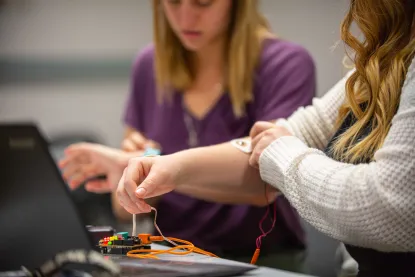
Neuroscience at NMU
Northern is one of only a few public teaching universities in the country to offer a bachelor’s degree in neuroscience. At NMU, not only will you be part of a top-notch academic program, but you’ll also get experience working in a laboratory setting as you assist ongoing research conducted by our own faculty – faculty like Professor Joshua Carlson, who is conducting research on cognitive functioning and emotional processing in disorders like depression and anxiety.
The neuroscience major is designed for students who wish to pursue a career or graduate studies in the field of neuroscience. Neuroscience is the scientific study of the nervous system and emerges from a fusion of multiple fields, including biology and psychology. This major provides a foundation for pursuing graduate studies in neuroscience with the potential goal of conducting neuroscience research in academia or industry.


Neuroscience Facilities and Equipment
The neuroscience program benefits from state-of-the-art facilities from both the psychology and biology department. Access to this equipment allows students to gain experiences that will set them apart from the competition when applying for graduate school or jobs.
Equipment at NMU includes,
- Confocal microscopy
- IMARIS Image Analysis Software
- Flow cytometry
- Cryostat for histology
- Animal facilities
- Optogenetics
- NIRS (optical imaging)
- EEG (electroencephalography)
Learning to use advanced neuroscience techniques places our students on the cutting edge for training in neuroscience research. To learn more, contact either the biology department or psychology department.
Job Outlook
The U.S. Bureau of Labor Statistics reports a significant increase in the need for people in this field, rising 19 percent over the next decade.
Our alums have gone on to study at institutions like the University of Michigan and Wayne State University here in Michigan. We also have alums doing their post-doctoral fellowships at U of M, University of Florida, Tufts University and the University of Indiana, to name a few.
Though the program is tailored to those looking to further their education through graduate studies, employment is available immediately upon receiving your undergraduate degree, preparing you for entry-level research positions in the pharmaceutical industry or at research institutions.
Here is an expansive list with just some of the options that will be available with a neuroscience degree.
Practitioner Fields in Psychology
- Clinical neuropsychologist
- Counseling psychologist
- School psychologist
Medical Fields
- Neurologist
- Neurosurgeon
- Psychiatrist
Allied Medical Field
- Physical therapist
- Occupational therapist
- Social worker
Research Fields
- Neuroscientist
- Behavioral neuroscientist (psychobiologist, biopsychologist)
- Neurobiologist
- Neuropsychologist
- Psychophysiologist
- Neurochemist
- Comparative psychologist
- Evolutionary psychologist
Others
- Laboratory technician
- Pharmaceutical company sales representative
- Scientific instrument salesperson
- Medical education writing
- Public science official
- Grant funding agency official
- Journalist (on neuroscience-related topics)
- Research compliance

